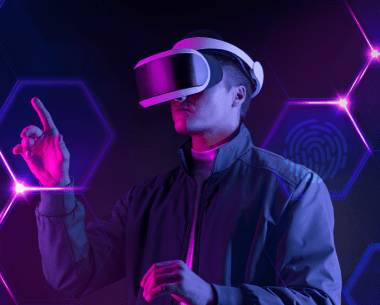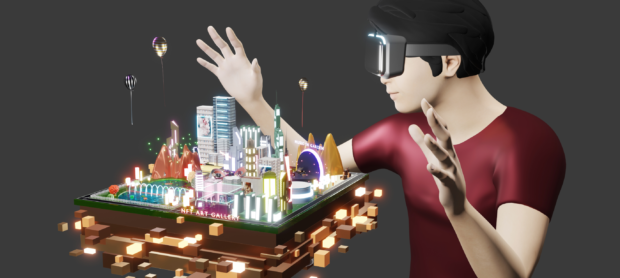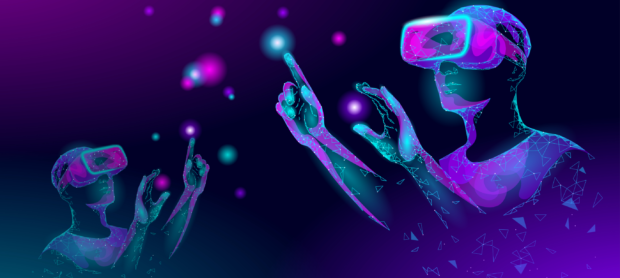The contemporary notion of the metaverse has been gaining copious amounts of traction as of late, particularly in the spheres of technology and game design. Fundamentally, the term “metaverse” denotes a simulated habitat that is engendered by the fusion of multifarious platforms and technologies and fosters the creation of a mutually shared, immersive experience. It is a realm where users can engage with digital artifacts and other users in real-time, muddling the lines of demarcation between the physical and digital worlds.
The metaverse harbors the potential to profoundly shape the trajectory of technological advancement in the future. It has the capacity to wholly revolutionize our lifestyle, professional career, academic pursuits, interpersonally interactive behavior, and even media consumption. The metaverse has the potential to overhaul the way we appraise orthodox entertainment and media consumption since it can be leveraged to fabricate virtual experiences that are just as all-encompassing and gripping as those in the tangible world. Envision having the liberty to attend a concert or sports event in the metaverse, being completely immersed in the unfolding action, intermingling with fellow spectators, and basking in the sensation of being seated right at the forefront.
Ultimately, the metaverse represents a technological frontier that stands to radically alter the manner in which we interface with our surrounding environment. In the upcoming years, we may anticipate some truly mesmerizing developments in this domain, as technology advances further and more individuals adopt it into their daily lives.
What is the Metaverse?
The metaverse is a concept that has gained significant attention in recent years, especially in the world of game development and technology. This virtual world, essentially a collaborative space spawned by the convergence of diverse technologies and platforms, first surfaced in Neal Stephenson’s novel, Snow Crash, and has since garnered significant interest in the gaming and tech sectors.
The lineage and progression of the metaverse can be retraced to the initial stages of the internet’s inception when individuals began to experiment with fabricating virtual spaces. However, the concept became more feasible with the development of sophisticated technologies such as augmented reality and virtual reality. Today, the metaverse is no longer an abstract idea but is gradually becoming a palpable actuality, made possible by various virtual realms and platforms like Second Life, VRChat, and Decentraland.


The metaverse presents several use cases and applications, ranging from virtual reality gaming, and social platforms to educational experiences. In virtual reality gaming, users are able to wholly immerse themselves in a virtual universe and interact with other players in real time, thereby delivering a more sociable and immersive gaming experience. Social platforms like VRChat enable users to engage with each other in virtual spaces, thereby delivering a more personalized and captivating social experience. Finally, in the educational arena, the metaverse has the potential to deliver interactive and immersive learning experiences, thereby affording learners the opportunity to explore digital environments and acquire hands-on experiences.
Overall, the metaverse is an intricate and thrilling concept that is poised to disrupt the way we interact with technology and each other. As technology evolves and becomes more ubiquitous, we can expect to see even more exhilarating developments in the metaverse space.
Why is the Metaverse Important?
Since it has the ability to completely change how we interact with technology and one another, the metaverse is an essential idea. The capacity to create immersive experiences that simulate a fusion of the real and virtual worlds is only one of the many potential advantages of the metaverse. The entertainment, education, and healthcare sectors, among others, may be significantly impacted by this.
The danger of addiction and the possibility that users might lose touch with reality are possible negatives to the metaverse, however. Before adopting a new technology entirely, it’s vital to weigh its advantages and disadvantages, like with any new technology.
The metaverse has the ability to develop new markets and employment possibilities from an economic and social standpoint. The growth of virtual experiences will need the creation of new virtual settings and experiences by content producers, developers, and designers. New sources of money and economic expansion may result from this.
Moreover, since it enables global connectivity and real-time interaction between individuals, the metaverse has the potential to significantly alter social relationships. As a result, barriers may be dismantled and new groups founded on similar experiences and interests may emerge.
Lastly, sectors other than entertainment, including education and healthcare, might be revolutionized by the metaverse. The metaverse has the potential to revolutionize learning and skill acquisition by enabling the creation of virtual learning environments and training simulations. To assist patients to overcome their anxieties and phobias in a secure setting, the healthcare sector may leverage the metaverse to provide immersive treatment experiences for them.
All things considered, the metaverse offers a major potential for technology to alter how we interact with our surroundings. The metaverse has the potential to have a really transformational influence on a variety of businesses, despite the fact that there are possible dangers and negatives to take into account.
Building the Metaverse
Building the metaverse is a complex task that requires a wide range of technologies and infrastructure. To provide consumers with a smooth and immersive experience, various difficulties and barriers must be overcome. The need for compatibility across various platforms and technologies is one of the largest obstacles. Users must be able to switch between many virtual settings with ease in order for the metaverse to function, which necessitates a high degree of interoperability.
The necessity for a strong and trustworthy infrastructure to support the metaverse is another difficulty. High-speed internet connections, robust servers, and cutting-edge graphics processing capabilities are examples of what this entails. It will be challenging to provide consumers with a smooth and immersive experience without these infrastructural elements.

The metaverse ecosystem has a large number of stakeholders in addition to technical difficulties. This comprises investors, consumers, technological firms, and game producers. It may be challenging to coordinate and align these interests in order to build a successful and coherent metaverse ecosystem since each of these actors has their own particular interests and objectives.
Despite these obstacles, the area of metaverse technology is seeing a lot of promising advancements. We may anticipate tremendous development in the metaverse in the next years because of companies like Roblox, Epic Games, and Facebook’s major investments in the field.
In general, creating the metaverse is a difficult endeavor, but the potential benefits are great. We can develop a technology that is genuinely transformational and has the ability to alter how we connect with the world around us by conquering the difficulties and barriers that are present.
The Future of the Metaverse
The metaverse, an enthralling and expeditiously advancing arena, holds immense potential for the future. Despite encountering myriad impediments, it is indisputable that the metaverse will burgeon and metamorphose over the impending years.
Numerous prognostications for the evolution of the metaverse encompass the perpetuated expansion of virtual worlds, the creation of augmented and realistic experiences, and the fusion of artificial intelligence and other state-of-the-art technologies. Additionally, we can anticipate innovative applications of the metaverse, such as virtual concerts, conferences, and even simulated tourism.
The plausible impact of the metaverse on society, the economy, and technology is profound. From a societal viewpoint, the metaverse has the power to shatter barriers and engender new communities based on shared interests and experiences. Furthermore, it can be a formidable tool for education, enabling students to learn within immersive virtual environments.
In terms of the economy, the metaverse has the potential to instigate new industries and employment opportunities. As virtual experiences proliferate, the need for content creators, developers, and designers to construct new virtual environments and experiences will soar. Consequently, this can generate new revenue streams and augment economic progress.
Lastly, there are consequential ethical and legal concerns that must be addressed in the context of the metaverse. For instance, issues surrounding privacy and data protection will need to be tackled to ensure the security of users’ personal information. Moreover, concerns regarding addiction and the possibility of users becoming disassociated from reality may emerge.
To conclude, the future of the metaverse is an exciting and swiftly advancing field. Despite encountering a plethora of obstacles, the prospective benefits are substantial, and we can anticipate enduring expansion and innovation in the coming years.


Conclusion
In conclusion, the metaverse represents a new frontier in technology, offering the potential for immersive and engaging virtual experiences that could revolutionize the way we interact with each other and the world around us. The evolution of the metaverse is already under way underway tools and programs are being created all the time, even if there are still numerous difficulties and barriers to be surmounted.
This article has examined the definition and background of the metaverse as well as its possible effects on culture, business, and technology. Along with some forecasts for the metaverse’s future growth, we have also spoken about the difficulties and barriers that must be surmounted in order to construct it.
Overall, the potential of the metaverse as the future of technology is significant, offering a wide range of opportunities for innovation, growth, and new experiences. If you have an idea for a metaverse application or experience, don’t hesitate to contact us at Eventyr. Our professional team will help you turn your idea into reality with cutting-edge technology and a deep understanding of game development and the meta universe. Contact us today to learn more!




